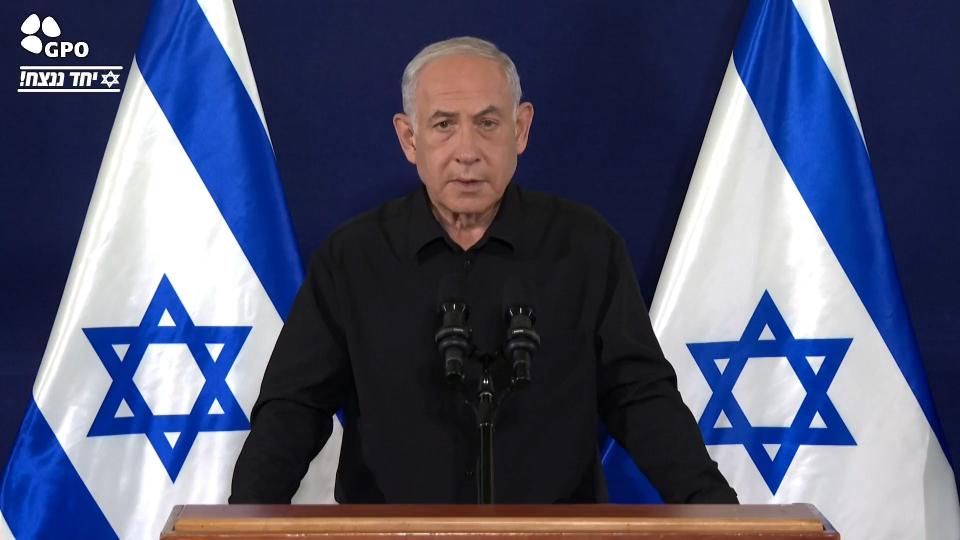Netanyahu indicates Israel plans to control Gaza after its war with Hamas ends
Prime Minister Benjamin Netanyahu indicated Israel plans to hold a tight grip on the Gaza Strip, the coastal enclave home to more than 2 million Palestinians that is controlled by Hamas, after the war winds down.
One month after the Hamas attack that killed 1,400 people in Israel, Netanyahu said his country "will have overall security responsibility" in Gaza for "an indefinite period" after its war with Hamas ends. He made the remarks in an interview with ABC News that aired Monday night. The Israeli military has been battering Gaza since Hamas crashed across the border Oct. 7, conducting a violent rampage that left 1,300 Israelis dead before fleeing back to Gaza with the hostages. The Israeli death toll has since risen to more than 1,400, the government says. The Hamas-run Gaza Health Ministry says more than 10,000 Palestinians have perished.
Though Netanyahu did not elaborate, it was the first time that Israel's leader publicly shed light on his apparent long term plan for Gaza, large parts of which Israeli airstrikes have reduced to rubble.
More than 10,300 people have been killed in Israel's bombings in Gaza over the last month, including more than 4,100 children, according to the Hamas-run health ministry. United Nations Secretary General António Guterres has warned that Gaza is becoming "a graveyard for children."
Netanyahu told ABC News that Gaza, which Israel captured along with the West Bank and east Jerusalem in the 1967 Mideast war, should be governed by "those who don’t want to continue the way of Hamas."
Biden in Israel: President embraces Netanyahu, says Israel must again be 'safe place' for Jewish people

Hamas seized power in Gaza from the Palestinian Authority, which has administrative control over parts of the West Bank, in 2007 ? two years after Israel withdrew its troops from Gaza. Since that withdrawal, Israel has maintained control over Gaza's airspace, coastline and all but one of its border crossings.
Still, while it was not immediately clear what Netanyahu had in mind as part of this "overall security responsibility" for Gaza, Nimrod Novik, a former adviser to Israel's national security council, said that there is a "notion circling around" that it could be similar to the arrangement that Israel shares with the Palestinian Authority in the so-called Area B part of the West Bank.
The West Bank was divided up into administrative Areas A, B and C as part of the Oslo Accords signed by the Palestine Liberation Organization and Israel in 1993 and 1995. In Area B, the Palestinian Authority controls education, health and other civilian matters. Israel exerts full control over security matters.
But Novik said that any such plan would require something that is just not realistic: a willing partner.
"There is no third party that is going to take responsibility for Gaza should Israel insist on post-war security control of Gaza. ... (There is no one who will) release Israel from the burden of occupying it long term with its 2.3 million Palestinians. It's just not going to happen."
Leaving family behind: For American stuck in Gaza, escape from war had a painful cost
Novik, who was previously a foreign policy advisor to Shimon Peres, Israel's former prime minister, is now a fellow at the Israel Policy Forum, an American Jewish organization that advocates for a two-state solution to the Israeli–Palestinian conflict. He was ultimately skeptical over whether Netanyahu's comments were really meant to be constructive or simply reflected a political necessity.
"His reasons for coming up with it have very little to do with what will happen the morning after the Israel Defense Forces completes it mission in Gaza and wishes to exit. And everything to do with coalition considerations and factions on which he depends on for his majority in government who will not hear of bringing the Palestinian Authority back to Gaza," he said.
Netanyahu's office did immediately return a request for clarification on his plan for Gaza.
The Biden administration is talking to Israeli officials and others in the region about what governance in Gaza should look like after the war, according to John Kirby, White House spokesman on national security.
“We're not at a point right now where we can point to a specific solution set here,” Kirby told reporters Monday. “Obviously, governance in Gaza post conflict is going to be critically important. What that looks like and who's responsible for what aspect of it, again, are all questions we're asking ourselves, and we're going to be in discussions with our partners about.”
What is clear, Kirby emphasized, is “Hamas can’t be in control of Gaza anymore.”
“We can’t go back to Oct. 6,” he said.
U.S. Secretary of State Antony Blinken has suggested the U.S., in an apparent divergence from Israel's position, would like to see the Palestinian Authority at the center of discussions about Gaza's future. Palestinian Authority President Mahmoud Abbas has said "the Gaza Strip is an integral part of the State of Palestine."
Tzipi Livni, who has held several cabinet positions in Israel's government, including roles as foreign minister and vice prime minister, said that she was not willing to "be a commentator on the prime minister's" words but in general the thrust of his remarks reflected that "Israel does not want to reoccupy Gaza."
Livni said it might be more useful to consider a recent phrase uttered by Yoav Gallant, Israel's defense minister, about Gaza and the question of Israel's hold on it after the war ends: "Freedom to operate."
"Israel needs to know that its civilians are secure from threats coming from Gaza," she said.
Contributing: Maureen Groppe
Opinion: How Hamas trumped Netanyahu holds lesson for divided United States. Wake up, America.
This article originally appeared on USA TODAY: Netanyahu indicates Israel plans to control Gaza after Hamas war ends
